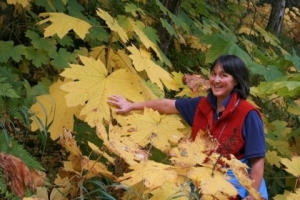
Available now from the University of Alaska Press, “Oil and Water” was among finalists in 2012 for the national PEN/Bellwether Prize. The award is for previously unpublished fiction centering on social justice issues.
“‘Oil and Water’ is a plea for us to take better care of each other as well as the world we inhabit,” Evans told the APU Blog.
An APU faculty member since 2000 and an Alaska resident for nearly 40 years, Evans said her novel, depicting small-town Alaska in the aftermath of a massive oil spill, is both love song and thank you to her adopted home state.
“Oil and Water” explores the American Dream interrupted by a disaster that upends life in Selby, a fictional coastal Alaska town whose well-being is threatened – perhaps irrevocably – when an oil tanker runs aground in the Gulf of Alaska.
Evans’ characters face a choice that feels increasingly familiar in a fossil-fuel dependent world: What becomes of our connections to each other and the natural world when our economic survival, as well as the natural environment, is at stake?
“I lived this story,” said Evans, who served as a public information officer in Homer during the Exxon Valdez oil spill in 1989. Homer on Kachemak Bay was among Alaska towns where fishing seasons were disrupted or canceled because of oil-polluted waters.
“I’ve witnessed the tensions that developed when good-paying clean-up work was offered by Exxon,” Evans said. “Homer fishermen and others thought long and hard about whether they’d somehow be complicit if they took the money, which they truly needed.”
Nearly 11 million gallons of Alaska North Slope crude were released near Valdez when the Exxon tanker hit a charted reef, spoiling thousands of miles of coastline. Effects of the disaster, including a landmark class action lawsuit, lasted for decades after the wreck.
Completing much of the writing during her APU sabbatical in 2007, Evans was awarded an Individual Artist grant from the Anchorage-based Rasmuson Foundation to support her work on “Oil and Water.”
“The grant was a vote of confidence in my ability when I sorely needed one,” Evans recalled. She used part of the grant to hire a developmental editor who evaluated the in-progress manuscript and made suggestions for changes.
“Oil and Water” was a finalist for the PEN/Bellwether prize, a nationwide literary contest sponsored by novelist Barbara Kingsolver.
“It’s an honor to be recognized for fiction that focuses on environmental and social justice issues – topics that are central to my teaching and scholarship,” Evans said. “But I want readers to enjoy ‘Oil and Water’ first and foremost as a novel that’s satisfying in terms of interesting characters and their development.”
Evans’ previously published work includes short stories and scholarly essays and reviews. She is among editors of “The Environmental Justice Reader;” an essay in that volume was translated for inclusion in the French journal Ecologie et Politique.
Except for concentrated writing time during her sabbatical, Evans completed her novel while teaching full-time and raising her daughter, Jian, an Anchorage high schooler.
Among lessons learned to pass along to her APU students at work on novels of their own: “You have to excise everything that’s extraneous – and I mean everything,” said Evans, who’s considering screenwriting next. “My students have convinced me that screenwriting is a lot of fun.”
